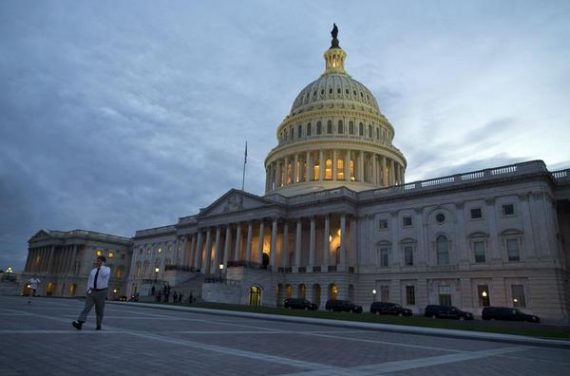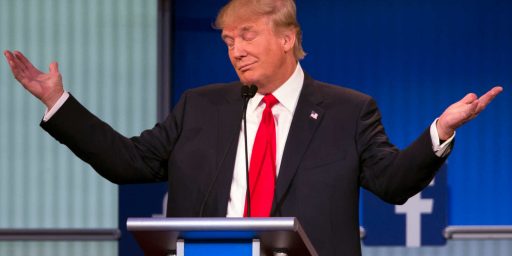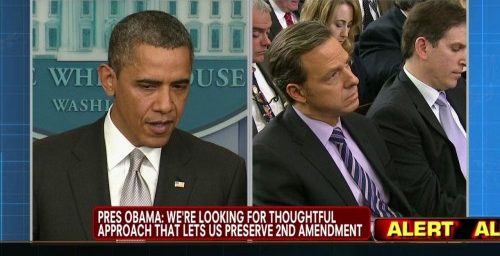Congress Rebukes Obama On Trade, And Thus The Lame Duck Era Begins
House Democrats defied President Obama on an important trade deal today, thus arguably marking the official beginning of his lame duck status.
After an unusual last minute visit to Capitol Hill to personally lobby Democratic members of the House, President Obama suffered a big loss today in a vote on trade promotion authority:
WASHINGTON — House Democrats rebuffed a dramatic personal appeal from President Obama on Friday, torpedoing his ambitious push to expand his trade negotiating power — and, quite likely, his chance to secure a legacy-defining trade accord spanning the Pacific Ocean.
In a remarkable rejection of a president they have resolutely backed, House Democrats voted to kill assistance to workers displaced by global trade, a program their party created and has stood by for four decades. By doing so, they brought down legislation granting the president trade promotion authority — the power to negotiate trade deals that cannot be amended or filibustered by Congress — before it could even come to a final vote.
“We want a better deal for America’s worke
rs,” said Representative Nancy Pelosi of California, the House minority leader who has guided the president’s agenda for two terms and was personally lobbied by Mr. Obama until the last minute.
Republican leaders tried to muster support from their own party for trade adjustment assistance, a program they have long derided as an ineffective waste of money and sop to organized labor. But not enough Republicans were willing to save the program.
Republican leaders then passed a stand-alone trade promotion bill, 219 to 211. That measure cannot go to the president for his signature because the Senate bill combined both trade adjustment and trade promotion.
Republican leaders now have two legislative days, beginning Monday night, to bring back the trade adjustment legislation for another vote.
“We are not done with this,” said Representative Kevin McCarthy of California, the majority leader.
But the sheer number of lawmakers who would have to change their votes make passage a second time doubtful, Republican leadership aides conceded.
The vote was an extraordinary blow to Mr. Obama, who went to the Capitol on Friday morning to plead personally with Democrats to “play it straight” — to oppose trade promotion if they must, but not to kill trade assistance, a move he cast as cynical. On Thursday night, he had made an unscheduled trip to the annual congressional baseball game to try to persuade Ms. Pelosi.
As with most things the come out of Congress, the Trans Pacific trade legislation if far from ideal, but it is generally a move in the right direction. As a rule, I’m troubled by these huge international, bureaucratic trade deals, but the reality in international politics is that these types of agreements are basically the only way to open trade with nations that have been historically protectionist toward foreign goods and competitors. The real issue here, though, hasn’t so much been the idea of a trade bill that would open up markets between the United States and dozens of Asian and Pacific nations, but the authority that is being granted to the President to negotiate the deal and then present it to Congress under a procedure that would limit the ability of the House and Senate to attach amendments that could potentially kill the deal. Again, this is less than ideal way to get the job done but in the context of complex international negotiations such as these the idea that a trade deal could be wrecked by a House intent on attaching a bunch of protectionist amendments would mean, most likely that no deal would be negotiated at all. Instead, what Congress will be able to do is give the deal an up-or-down vote. Given how much this raises the stakes, it makes it less likely that Congress would rebuke the President, of course, but it also ensures that a deal can be negotiated without the parties worrying about everything being wrecked later down the line for reasons that have nothing to do with trade, and everything to do with domestic American politics. On the whole, because of the demonstrable benefits to the American economy that would result from a trade deal like this, these seem like me to be acceptable procedural trade-offs in exchange for a deal that would vastly help the American economy.
Outside of the merits of the trade deal itself, though, the big news here is the rebuke to President Obama from so many of his fellow Democrats. Yesterday evening, President Obama made an appearance at the annual Congressional Baseball Game during which he spent a considerable amount of time talking to Democratic Congressmen, most likely about the vote today. Then, this morning, he took the unusual step of appearing before the Democratic Caucus’s morning meeting to make his case and he ended up getting humiliated. Minority Leader Nancy Pelosi, who had largely been silent on the issue and had even been rumored as leaning in favor of the bill, came out against the bill publicly, and then it was all downhill from there. These tweets from CNN’s Jake Tapper relating what he was told by two Democratic Congressman are particularly revealing:
House Democratic Rep #1 re: POTUS visit to Hill: “He was fine until he turned it at the end and became indignant and alienated some folks.”
— Jake Tapper (@jaketapper) June 12, 2015
House Dem Rep. #1 re POTUS: “Bottom line, he may have swayed some Ds to vote yes, but Pelosi sealed the deal to vote no.”
— Jake Tapper (@jaketapper) June 12, 2015
House Dem Rep #2: POTUS visit “absolutely” hurt the bill. “Democrats believe they often are taken granted and not appreciated” by POTUS.
— Jake Tapper (@jaketapper) June 12, 2015
Chris Cillizza contends that this is proof that the Presidential “bully pulpit” is largely overrated and that its power has been reduced in the modern political age. To some extent, his argument has merit, but the reality is that this rebuke on the trade deal is part of a very long pattern for this President. Even when it comes to his own party, President Obama has been singularly unable to advance his agenda on Capitol Hill. The stimulus bill that was passed in the first months of the Presidency was largely a collection of wish list items that Democrats had been making in the years since they’d lost control of Congress in 1994. Drafting and passage of the Affordable Care Act was largely left to Congress itself despite the fact that the White House was claiming it to be the most important piece of legislation of Obama’s entire Presidency. And, in other instances, the President has been shown to be markedly ineffective at keeping hold of the support of the members of his own party. Add into that the problems he’s had with Republicans, and one can only conclude that this President simply lacks the legislative and persuasive skills of someone like Bill Clinton or Ronald Reagan, both of whom were able to get action from Congress notwithstanding the fact that it was controlled in whole or in part by the opposing party. Some have suggested that this is due to the fact that Obama is singularly bad at forming relationships with people in Congress, or that he simply didn’t have any experience dealing with a recalcitrant legislature before becoming President, but whatever the reason is, it has happened often enough over the course of this Presidency that it seems to be undeniable, and it will likely go down in history as one of the defining characteristics of his time in the White House.
If this defeat means anything, though, it means that we are now well into Barack Obama’s lame duck period. It’s not surprising that Obama was unable to persuade his fellow Democrats today, because they really don’t have any reason to fear him anymore and there’s very little that he can do for them. Many of these members, no doubt, are already looking at Hillary Clinton as the de facto leader of their party, and the fact that she has been silent on this issue should speak volumes. If Clinton had spoken out in favor of the trade deal, it likely would’ve passed today. She’s staying silent, though, most likely because she doesn’t want to upset the progressive wing of the party that has been lobbying against the deal. In other words, Clinton could have saved Obama from this defeat today but instead she has her own interests in mind, and so do the members who rebuked him. That’s the definition of a lame duck.







Obviously this was an attack on Obama because he is black. This has nothing to do with policy…no.
I’m not sure it is the beginning of the lame duck…as much as it is a troubling bill.
Fast track authority I wouldn’t give to the likes of Rand Paul or Ted Cruz or Scott Walker for certain. Probably a bad deal for American workers, and bad for slave labor overseas.
And then of course Paul Ryan put in some climate change denial nonsense.
Maybe they actually read the bill this time. Any real Democrat who did couldn’t possibly vote for it.
Not to be pedantic, but “Lame Duck” simply refers to any politician nearing the end of their term, especially when they are unable to run for re-election.
So, this isn’t about lame duckery, but it is about agreements negotiated in secret when the consensus on the left is that the last big go-round, NAFTA, hurt more than it helped.
Mr. Obama has always sucked at the back-slapping and arm-twisting. Like many chilly intellectual types he believes all he needs to do is present a convincing argument. He’s not LBJ. But of course we’ve legislated and ruled our way out of that kind of arm-twisting. LBJ and his minions on the Hill could buy votes with earmarks and set-asides; Obama doesn’t have that tool. And God knows he’s done little to forge alliances on the Hill.
This would have been a job for Biden, but I would imagine he’s a bit hors de combat at the moment.
I think this is a defeat for business-oriented centrists whether they are left or right. This demonstrates that left and right wing populism is gaining strength. This is just as much a defeat for Establishment Republicans as Obama.
So the questions are these:
1) Where does business put their political bucks now?
2) Can left and right populism find common ground or will they fight over cultural issues instead?
3) Did Democrats get further irritated by Republican attempts to add climate change and immigration issues to this? Was that the last straw?
Personally, I don’t know where I stand on the TPP agreement. I guess having it done in secret makes it impossible to judge and the “trust me” factor is no longer there, assuming it was ever there.
Doug: “House Democrats defied President Obama on an important trade deal today, thus arguably marking the official beginning of his lame duck status.”
‘Arguably’ in the sense that one can make the argument, not in the sense that the argument is any good.
Doug, do you really think a system of extra-judicial binding arbitration staffed by corporate attorneys, enabling multinationals to sue governments under virtually any pretext is a move in the right direction?
Actually his lame duck era began when the teahardists took over the House in 2010.
Isn’t this the 2,516th time the President has been declared a lame duck?
Nonsense, really. The stimulus bill, which you dislike because conservative economics blinds you to reality, wasn’t a collection of wish list items and did in fact work, contrary to Republican mythology.
It would have worked better if it had been bigger, but Republican “massive resistance” had a lot to do with that-as it indeed had to do with every one of Obama’s legislative failures before this.
Obama in fact did pass quite a lot of legislation, including HCR, which Democrats had been trying to pass since 1948. ( I like how Doug tries to seperate Obama from the ACA , which the Republicans have ben calling Obamacare since day one). Doug even left out things like DADT repeal, which is standard for Doug, since in his reality, Democrats must get no credit for advancing his pet issue of gay rights. There’s also Dodd-Frank, the START treaty renewal and the extension of the Bush tax cuts.
As to this present bill, the sad thing about it is that Democratic legislators have seen Obama negotiate-and they just don’t trust him not to give away the store( Full disclosure: I agree with them. Obama sucks as a negotiator, although he is better than most liberals believe). This, plus the fact that from what we have seen of the draft provisions, business is rolling labor, and I fully understand why Democrats aren’t signing on.Then there is the example of NAFTA, which liberals saw as a disaster for labor.
Still, maybe the bill can be salvaged. But unlikely, unless Obama agrees to put in provisions that Republicans won’t buy.
@Ron Beasley:
Exactly. And considering that, he’s probable been the most effective Lame Duck president in our history.
Does anyone know where I can get a copy of this agreement ?
@stonetools: The stimulus bill worked ? Yes, for few college research teams who got tax payers money for such important projects as a study of twitter, a study of video games, and a tunnel for turtles. But not for more worthy projects such as modernizing and upgrading the interstate highway system, rebuilding and securing the electrical grid, research and development of alternative fuel vehicles. These projects could have provided thousands of long term jobs for workers and contractors. There should have been a requirement of 1 job for every $30,000.
“It seems all those shovel ready jobs weren’t so shovel ready” President Obama.
See “Stimulus bill outrages !”
@Tyrell:
Did President Obama fail to recharge his Green Lantern ring in 2009?
You’re right though. If Obama had lead with leadership, then he could have gotten anything he wanted at any time regardless of any and all circumstances. Because Presidents are God-Philosopher-King Superheros or something.
@Tyrell:
Well, that’s the problem: there is no copy and no agreement. This is essentially a “trust us” deal where we give authority to cut a deal without being told what the deal is.
@michael reynolds: we give authority to cut a deal without being told what the deal is.
Isn’t that what was done for all previous trade deals?
Mike
@Tyrell: This is the problem, Tyrell. One, the agreement is not completed yet. Two, it is being negotiated in secret behind closed doors and firewalls by hundreds of government and corporate lawyers from many countries. If I understand correctly, the only way members of Congress can see what has been accomplished so far is to view the drafts in a closed room nd not take any notes.
To me the secrecy is detrimental to the process given the lack of trust in our society at all levels. I don’t have a solution for that.
@Tyrell
https://www.whitehouse.gov/sites/default/files/docs/cea_arra_report.pdf
@MBunge:
But somehow it’s an outrage when Obama wants to do it. Like everything else, down to the most trivial and routine act of government.
Good analysis from David Dayen here:
Just goes to show how correct the commenters here have been. The Democrats have clearly finally discovered Obama’s race, and now are blocking his legislation because they’re racist. It’s obvious.
@Guarneri: And do you have anything useful to contribute? Do you think the TPP is a good or bad thing? Do you think the Executive Branch should have fast track authority? Or should we wait to see what’s in the agreement? We’ll wait for your insights,
@MBunge: the previous trade deals haven’t exactly enriched the average dude on the street either.
Weird how people think it’s 1995 and the benefits of free trade are just so obvious.
@Modulo Myself: In theory it is. What isn’t at all obvious is that these trade deals have much to do with free trade. But you wouldn’t learn that from the supposedly liberal MSM.
@Tillman: I’m no free trade fanatic. I have yet to see anyone, however, explain how this or any trade deal gets done without fast track authority. How can U.S. negotiators do anything if they have to qualify ever offer, proposal, demand or concession with “Of course, Congress may completely change everything I’m saying”?
Mike
An interesting twist in the debate is that the Republicans have enough votes in the House to pass any trade deal they want without any Democratic help. But as usual, John Boehner can’t whip for sh!t, so now its up to Nancy Smash to bail out his useless a$$ again-for a trade deal that doesn’t give any benefits to crucial Democratic constituencies like labor, or doesn’t advance Democratic priorities like infrastructure spending or paid family leave.
My guess is Nancy finally said, “Enough! I’m not going to bail out Agent Orange again just to make Republicans, big corporations, and the President happy! Put something substantial on the table that I can sell to my people, then we’ll talk!”
It’s interesting that the narrative is “President is now a lame duck!’ or “Democrats in disarray!” and not “Boehner fails again!” or “House Republican disunity continues!”
What @stonetools: said. The GOPs can haul their own water. And Pelosi may be able to squeeze out a better deal. I confess, though, I’m not seeing why Obama is pushing hard for this deal.
I guess it,will be a lame duck weekend when congress comes back and passes it on Monday.
..
@MBunge: To my knowledge no previous trade negotiations have been classifed under the rubric of national security. So the answer is no.
@MBunge:
Yeah, but is that really a recommendation?
@Scott:
The answer is no, Guarneri has nothing to offer but vacuous, usually indecipherable and always unfunny snark.
@MBunge: Input from our elected representatives prevents U.S. negotiators from gerting anything done? Then it stands to reason the hundreds of corporate lobbyists actually writing the bill are interfering with said negotiators, yet they get their proposals cut-and-pasted into the text.
Any argument that corporate stooges get a pass but Congress has to stay out is warped thinking.
@gVOR08:
Its not even beyond the bounds of possibility that once Nancy saw Boehner didn’t have the votes lined up (again!), that she told the President, “I’m coming out against it and I’m going to use my leverage to get something for the Democrats.”
That’s some three dimensional chess there, but hey, why not?
@michael reynolds:
Not a fan of TPP, and glad it was voted down this time, but the secrecy meme is annoying: every negotiation in human history was secret at some point.
@stonetools:
This, times 1,000. I can see myself supporting the TPP, if it sweetened by significant liberal priorities (say, infrastructure saving and higher minimum wage). However, for Obama to force Democrats to vote for a business/GOP priority, and then get no goodies in the legislation and then see the legislation amended to appeal to far right republicans? Hell, no!
@Ben Wolf:
Quick: name any international convention that was signed, then was amended by the legislative body of a major power, and then was accepted by all the other partners as is, without a further round of negotiations, or people walking off the table?
Imagine the US signs a climate pact with teeth, and then Congress amends it to say global warming is a myth, and taxes solar energy to boot. Do you expect the other parties to the negotiation to just sign the new text of the compact?
Again: I am oppposed to the agreement. Stopping the fast track authority was a good thing because it stopped the agreement. However, the whole “secrecy!” “Congressional oversight!” meme is idiotic.
@humanoid.panda: You arw intentionally mischaracterizing the circumstances surrounding crafting of TPP TiSA and TTIP. No previous administration has classified the text of previous trade bills. No previous administration has threatened anyone discussing said text with prosecution. And you compound Mbunge’s erroneous thinking by parroting his comment. Congress being involved will ruin things but lobbyists getting U.S. negotiators to cut-and-paste their wish lists into the text don’t? Input from Congress is harmful but input from hundreds of corporate shills is not? This is what you are arguing.
Obama has been a lame duck since the GOP won the House in 2010. He’s been quacking since January 3, 2011. After the destruction of Obamacare and the stimulus the American people put a restraining order on him and that has stuck for the past four and a half years.
SCOTUS is now in the process of rolling back the damage he has wrought on our country. With the GOP running Congress, the Obamacare “problem” could be fixed in a one sentence bill. Think that’s going to happen? LOL!!!!!!
Both Brad Delong and Paul Krugman have now come out against TPP and when you lose Delong and Dr.K , then you haven’t made your case ( Stiglitz opposes it too, which is pretty much the trifecta for liberal economists). Dr. K:
Ouch!
@Ben Wolf: To my knowledge no previous trade negotiations have been classifed under the rubric of national security.
Everything is classified under national security these days. Is the secrecy around this trade deal greater than previous deals? And from where does this demand for confidentiality come? Is the Obama Adminstration demanding it or is it something ALL SIDES insist upon?
I’m not against shaking the globalist Utopianism that animates the trade establishment and I’d agree with the observation that this is about Pelosi getting sick of providing Dem votes to make up for GOPers who refuse to support something they absolutely would under a Republican President.
Again, though, no one has explained how any trade deal like this can be made without fast track authority.
Mike
@Ben Wolf:
As I said before, I am opposed to the TPP . I also think that there is simply no international convention that the US could ever sign that would survive the Congressional amendment process. I am ok with voting down the TPA for substantial reasons- the agreement is bad, but the process argument is silly, and you repeating it time after time (while ignoring that no matter the influence of lobbyists on administration, Congress is worse) doesn’t make it any less sillier.
@humanoid.panda: @humanoid.panda: “Not a fan of TPP, and glad it was voted down this time, but the secrecy meme is annoying: every negotiation in human history was secret at some point.”
The whole point about fast-track authority is to extend the secrecy part to as close as possible to the end of the whole process.
As has been pointed out, corporate lawyers and lobbyists have access, and can put things into the treaty, but nobody else can even see it, except under ridiculous constraints.